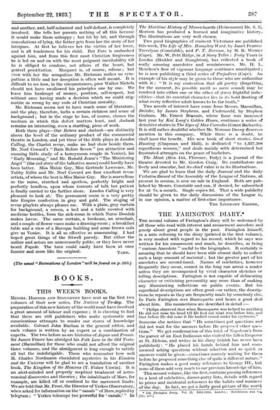BOOKS.
THIS WEEK'S BOOKS.
MESSRS. 110DDER AND STOUGIITON have sent us the first two volumes of their new series, The Nations of To-day. The preparation of this new history of the world must have involved a great amount of labour and expense ; it is cheering to find that there arc still publishers who make systematic and conscientious attempts to render our stores of knowledge available. Colonel John Buchan is the general editor, and each volume is written by an expert or a combination of experts. The two before us are histories of Japan and France. Sir James Frazer has abridged his Folk Lore in the Old Testa- ment (Macmillan) for those who could not afford the original three volumes, and the abridgment is long enough to satisfy all but the indefatigable. Those who remember how well M. Charles Nordmann elucidated mysteries in his Einstein and the Universe will be glad to see a translation of another book, The Kingdom of the Heavens (T. Fisher Unwin). It is an alert-minded and properly sceptical treatment of astro- nomical discoveries and theories ; the inhabitants of Mars, for example, are killed off or confined to the narrowest limits. We are told that Mr. Frost, the Director of Yerkes Observatory, when asked for information on the " canals " of Mars, replied by telegram ; " Yerkes telescope too powerful for ' canals.' " In
The Maritime History of Massachusetts (Heinemann) Mr. S. E. Morison has produced a learned and imaginative history. The illustrations are very well chosen.
Two good biographies of eminent Victorians are published this week, The Life of Mrs. Humphry Ward, by Janet Penrose Trevelyan (Constable), and P. T. Barnum, by M. R. Werner (Cape). Mr. W. Pett Ridge, in A Story Teller : Forty Years in London (Hodder and Stoughton), has collected a book of really amusing anecdotes and reminiscences. Mr. II. L. Mencken's flow of vigorous language continues unmitigated ; he is now publishing a third series of Prejudices (Cape). An example of his style may be given to those who are unfamiliar with it : " It is my contention that all poetry (forgetting, for the moment, its possible merit as mere sound) may be resolved into either one or the other of (two) frightful imbe- cilities—that its essential character lies in its bold flouting of what every reflective adult knows to be the truth."
Two novels of interest have come from Messrs. Macmillan, Deirdre, by James Stephens, and Underworld, by Stephen Graham. Mr. Ernest Bramah, whose fame was increased last year by Kai Lung's Golden Hours, continues a series of detective stories in The Eyes of Max Carrados (Grant Richards). It is still rather doubtful whether Mr. Norman Davey deserves mention in this company. While there is a doubt, he shall have the benefit. His new book of short stories, Good Hunting (Chapman and Hall), is dedicated " to 1,887,208 superfluous women," and deals mainly with determined but frustrated attempts on the peace of bachelors.
The Mask (Box 444, Florence, Italy) is a journal of the theatre devoted to Mr. Gordon Craig. Its contributors arc lively and oracular, but its chief value is in its illustrations.
We arc glad to learn that the daily Journal and the daily Verbatim Record of the Assembly of the League of Nations, at present in session, is now on sale in England. Both are pub- lished by Messrs. Constable and can, if desired, be subscribed for at 7s. a month. Single copies 9d. That a wide publicity should be given to the daily discussions of the League is, in our opinion, a matter of first-class importance.
THE LITERARY EDITOR.






































 Previous page
Previous page